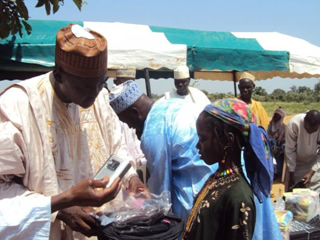Schools for Nomadic Communities in Jigawa
“Communities have increased their request for the establishment of more nomadic schools in Jigawa now because of ESSPIN’s intervention to support our efforts in reaching these communities” says Babawuro Fate, the Director for Monitoring and Evaluation at the state Agency for Nomadic Education.
Babawuro has been a key partner in ESSPIN’s collaborative engagement with nomadic education in Jigawa and has seen dramatic changes in recent times. There are more community demands at his office for more nomadic schools to be established. Even the way he and his colleagues work has changed with more remote schools being identified and supported by the state. Such schools include Mai Wando, a nomadic school located at the wetlands, and others in hard-to-reach areas of the state.
“We are now inundated by demands from several nomadic communities because of what ESSPIN is doing in conjunction with the Agency for Nomadic Education. There has been a 25% increase in communities now wanting their own school” says Alh Ali Manu,the Executive Secretary, Jigawa State Agency for Nomadic Education
ESSPIN seeks to reduce inequality and give all children access to quality education. One of the strategies employed is to expend the ESSPIN Challenge Fund to concentrate effort or investment on any part of the basic education system that would spur state governments to engage with the process. ESSPIN Jigawa therefore launched its support to nomadic education with the provision of school uniforms and learning materials to nomadic children. This initiative currently targets 3,000 children from 40 schools as beneficiaries across the state. It is anticipated that 6,000 nomadic children will be reached by 2014.
Since initiation of the ESSPIN Challenge Fund the results have been remarkable as more nomadic communities are now engaging with the Agency for Nomadic Education and making legitimate demands for more support. The state has responded to ESSPIN’s initiative by providing 7.1 million naira to this sector.
“It is evident that ESSPIN’s work with the Agency for Nomadic Education has touched deep into the heart of the nomadic communities of Jigawa. I know it sounds too demanding but we want more” says Babawuro in a deep unassuming tone.

A nomadic girl, Suwaibu Shehu, receiving a uniform from the SUBEB Chairman at the Challenge Fund Launch,